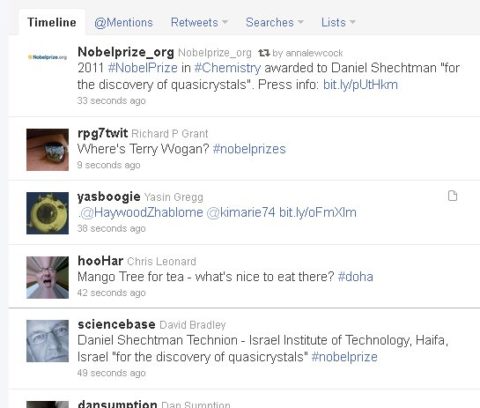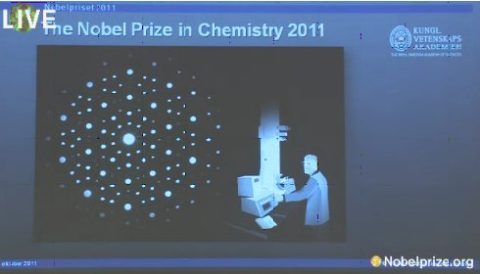The Royal Swedish Academy of Sciences has decided to award the Nobel Prize in Chemistry for 2011 to Daniel Shechtman
Technion – Israel Institute of Technology, Haifa, Israel “for the discovery of quasicrystals”
I got my tweet out seconds before NobelPrize_org and certainly before the rest of the chemistry blogosphere. Sad or what?

In quasicrystals, we find the fascinating mosaics of the Arabic world (see my Alhambra photos for examples) reproduced at the level of atoms: regular patterns that never repeat themselves. However, the configuration found in quasicrystals was considered impossible, and Daniel Shechtman had to fight a fierce battle against established science. The Nobel Prize in Chemistry 2011 has fundamentally altered how chemists conceive of solid matter.
Full Nobel Chemistry press release here.
UPDATE: Shechtman is 70 years old and his work is one of the first times we can date a Nobel-winning scientific discovery to a specific day in 1982. Committee is hoping to speak to him by phone, but they cannot get hold of him right now.

Quasicrystal patterns that are infinite and do not fit the normal requirements of regular solid, crystal structure, has revolutionised our view of solid matter over the years. It shook the foundations of solid-state science. The discovery has actually left us knowing less than we knew before the discovery. It changed the concept of crystallinity. We now do not know what constitutes a crystal. Indeed, we only have an operational definition now the defines a crystal as a solid that produces a diffraction pattern under X-ray irradiation. Regularity no longer comes into it. (To paraphrase committee member Sven Lidin).
UPDATE: Just had word from Professor David Phillips, President of the Royal Society of Chemistry: “Quasicrystals are a fascinating aspect of chemical and material science — crystals that break all the rules of being a crystal at all!” he says. “They’re quite beautiful, and have potential applications in protective alloys and coatings. The award of the Nobel Prize to Dany Shechtman is a celebration of fundamental research.”